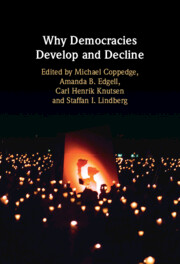56 results
Conceptual and Measurement Issues in Assessing Democratic Backsliding
-
- Journal:
- PS: Political Science & Politics / Volume 57 / Issue 2 / April 2024
- Published online by Cambridge University Press:
- 11 January 2024, pp. 162-177
- Print publication:
- April 2024
-
- Article
-
- You have access
- Open access
- HTML
- Export citation
Figures
-
- Book:
- Why Democracies Develop and Decline
- Published online:
- 28 June 2022
- Print publication:
- 23 June 2022, pp ix-xi
-
- Chapter
- Export citation
Appendix 4.C - Estimation
- from Appendices
-
- Book:
- Why Democracies Develop and Decline
- Published online:
- 28 June 2022
- Print publication:
- 23 June 2022, pp 270-271
-
- Chapter
- Export citation
Appendix 4.B - Other Networks
- from Appendices
-
- Book:
- Why Democracies Develop and Decline
- Published online:
- 28 June 2022
- Print publication:
- 23 June 2022, pp 268-269
-
- Chapter
- Export citation
Copyright page
-
- Book:
- Why Democracies Develop and Decline
- Published online:
- 28 June 2022
- Print publication:
- 23 June 2022, pp iv-iv
-
- Chapter
- Export citation
Tables in Appendices
-
- Book:
- Why Democracies Develop and Decline
- Published online:
- 28 June 2022
- Print publication:
- 23 June 2022, pp xiii-xiv
-
- Chapter
- Export citation
Appendix 6.B - Cox Hazard Models
- from Appendices
-
- Book:
- Why Democracies Develop and Decline
- Published online:
- 28 June 2022
- Print publication:
- 23 June 2022, pp 278-280
-
- Chapter
- Export citation
Appendix 3 - Variable Definitions
- from Appendices
-
- Book:
- Why Democracies Develop and Decline
- Published online:
- 28 June 2022
- Print publication:
- 23 June 2022, pp 262-264
-
- Chapter
- Export citation

Why Democracies Develop and Decline
-
- Published online:
- 28 June 2022
- Print publication:
- 23 June 2022
Contents
-
- Book:
- Why Democracies Develop and Decline
- Published online:
- 28 June 2022
- Print publication:
- 23 June 2022, pp v-viii
-
- Chapter
- Export citation
Bibliography
-
- Book:
- Why Democracies Develop and Decline
- Published online:
- 28 June 2022
- Print publication:
- 23 June 2022, pp 347-378
-
- Chapter
- Export citation
Appendix 7 B - Supplemental Tables and Figures
- from Appendices
-
- Book:
- Why Democracies Develop and Decline
- Published online:
- 28 June 2022
- Print publication:
- 23 June 2022, pp 293-324
-
- Chapter
- Export citation
Tables
-
- Book:
- Why Democracies Develop and Decline
- Published online:
- 28 June 2022
- Print publication:
- 23 June 2022, pp xii-xii
-
- Chapter
- Export citation
Appendix 8 C - Additional Path Models
- from Appendices
-
- Book:
- Why Democracies Develop and Decline
- Published online:
- 28 June 2022
- Print publication:
- 23 June 2022, pp 331-346
-
- Chapter
- Export citation
Appendix 4.A - Modeling Spatial Dependence
- from Appendices
-
- Book:
- Why Democracies Develop and Decline
- Published online:
- 28 June 2022
- Print publication:
- 23 June 2022, pp 265-267
-
- Chapter
- Export citation
Appendix 6.A - Details on Variables and Analysis
- from Appendices
-
- Book:
- Why Democracies Develop and Decline
- Published online:
- 28 June 2022
- Print publication:
- 23 June 2022, pp 275-277
-
- Chapter
- Export citation
Appendix 8 A - Structural Equations
- from Appendices
-
- Book:
- Why Democracies Develop and Decline
- Published online:
- 28 June 2022
- Print publication:
- 23 June 2022, pp 325-327
-
- Chapter
- Export citation
8 - Causal Sequences in Long-Term Democratic Development and Decline
-
-
- Book:
- Why Democracies Develop and Decline
- Published online:
- 28 June 2022
- Print publication:
- 23 June 2022, pp 215-261
-
- Chapter
- Export citation
Appendix 8 B - Variable Descriptions
- from Appendices
-
- Book:
- Why Democracies Develop and Decline
- Published online:
- 28 June 2022
- Print publication:
- 23 June 2022, pp 328-330
-
- Chapter
- Export citation
Appendices
-
- Book:
- Why Democracies Develop and Decline
- Published online:
- 28 June 2022
- Print publication:
- 23 June 2022, pp 262-346
-
- Chapter
- Export citation

